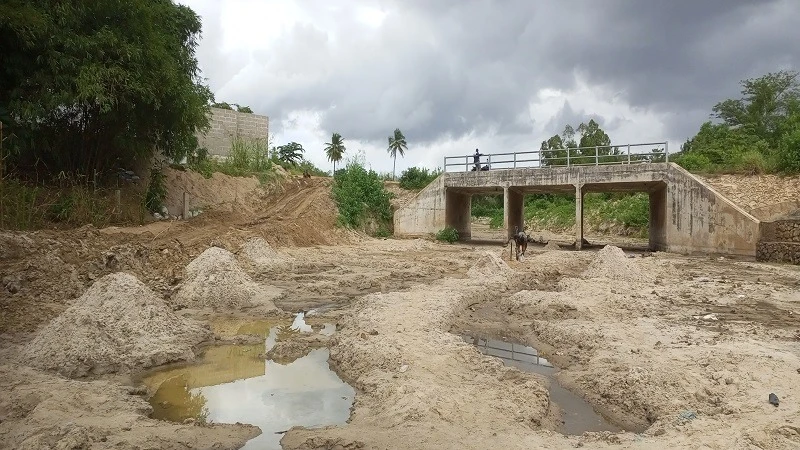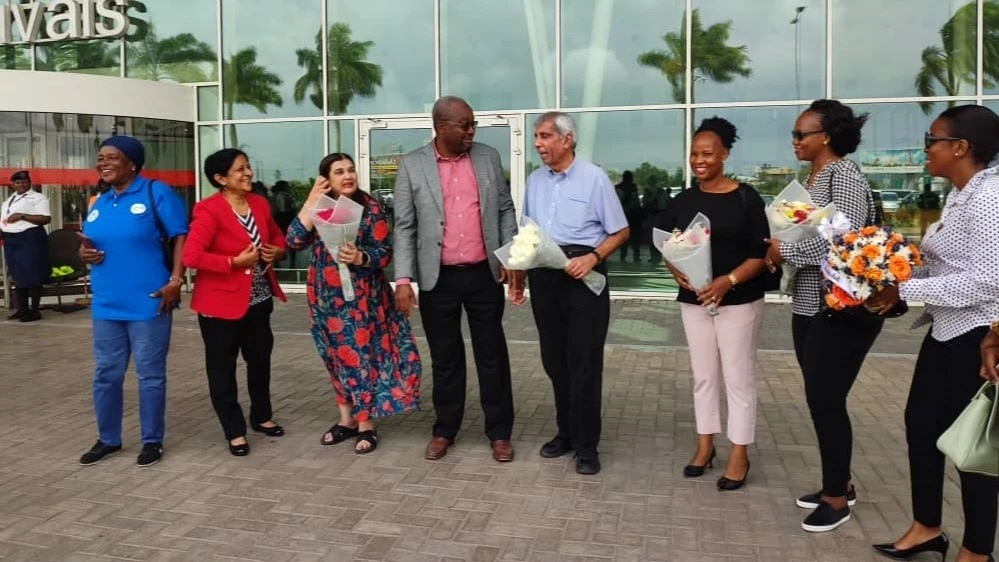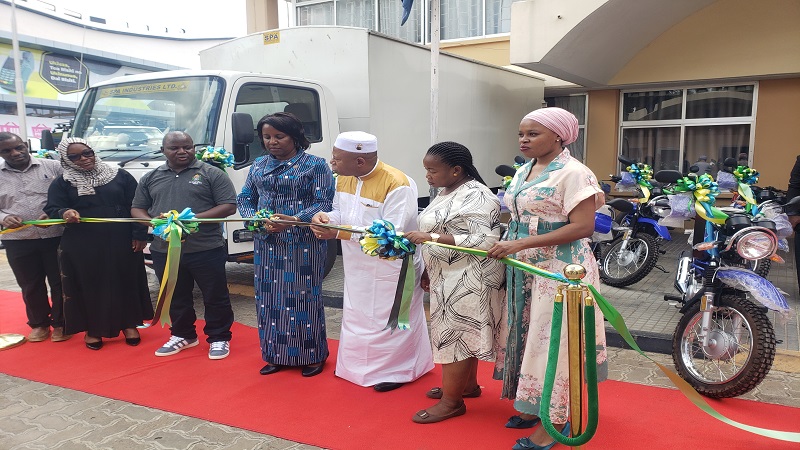SPECIAL REPORT: Sand Mining: A dilemma of job creation and worsening climate change risks- 3

SAND mining business for construction purposes in Tanzania’s big cities is raising a growing concern over climate change implications.
The government has legalized sand mining in riverbeds as part of encouraging self-employment by youths in the informal sector and by extension sand mining is one of the government’s sources of revenues accumulated through local government authorities’ approved levies.
Sand mining is also allowed by the government for cleaning riverbeds.
There is poor coordination of sand mining business by public authorities mandated with the regulation of the business in big cities which has resulted in accelerating environmental degradation and loss of nature.
The poor coordination of sand mining has resulted in a sharp rise in the number of unregistered sand miners, mostly youth groups who are eager at making handsome profit out of environmental degradation.
Sand mining has been eroding the banks of these rivers thus widening them to people’s residents resulting in houses being washed away by rainwater especially in rainy seasons which usually lasts for three months.
In Tanzania, the rainy season is witnessed between March and May though in some parts of the country, the rainy season is witnessed between October and December of every year.
However, climate change implications have resulted in variations of the rainy season with unpredictable periods of rain that has been reported by the Tanzania Meteorological Authority (TMA) to wreak havoc on commercial and peoples’ residential properties, farms and public infrastructure.
A two-month investigation by this journalist has discovered that in Dar es Salaam, unpermitted sand mining along the rivers of Msimbazi, Tegeta, Gide, Mbezi, Kawe and Mpiji is taking shape on the excuse of cleaning the rivers so that they don’t fill up with sand that might result in causing floods due to rainwaters losing direction of natural flow.
However, Jangwani open space and Kunduchi beach are also in the list of sand mines in the city flooded with unpermitted miners.
The investigation uncovered that along the Msimbazi River there are eight unpermitted youth groups formed by a minimum of 14 members each conducting illegal sand mining.
On the other hand, there are five permitted groups along the river which traverses from Pugu hills in the outskirts of the city into the Indian Ocean.
Along the Tegeta River there are five unpermitted groups against three permitted groups. Along the Gide River there are two unpermitted groups against two permitted groups. Mbezi River accommodates three unpermitted youth groups against two permitted groups.
Along Kawe River which three years ago the National Environment Management Council (NEMC) had banned sand mining on environmental degradation there are three unpermitted groups against four permitted youth groups.
Along the Mpiji River there are three unpermitted youth groups against four permitted groups. The same situation has been witnessed at Jangwani and Kunduchi areas.
Unpermitted sand mining also takes place in the rivers of Skanska and in suburban areas of Mbweni, Mgemuzi, Bunju and Mabwepande.
This journalist has visited Kisarawe district council in the Coast region where there are unpermitted youth groups carrying out sand mining in the mines of Mzenga and Msanga villages.
In Dodoma capital, he visited Mvumi and Kikombo, two of the eight sand mines while in Morogoro region he visited Kitaifa mines in Gairo district.
Godwin Mangowi, Muungano Ward Executive Officer in Ubungo District of Dar es Salaam city has refused to clarify why unpermitted sand miners are operating along the Tegeta River contrary to the city’s sand mining guidelines.
Anthony Masaika, Levy Officer at Ubungo District in-charge of the Tegeta River admitted that there are three unpermitted youth groups along the riverbed carrying out sand mining.
“I must confess that there is poor collaboration of the five authorities mandated with issuance of permits for sand mining in riverbeds and riverbanks. Each authority works on its own which results in the guidelines not to be fully enforced,” said Masaika.
According to him, a dump truck weighing 1.5 cubic meters of sand is charged a levy of 3,000/- per trip, those weighing three cubic meters of sand pay 5,000/- while those weighing 14 to 20 cubic meters are charged 10,000/- per trip.
Masaika said almost ten dump trucks of different weighing capacities take away sand mined from the Tegeta River with each going at least three trips on a daily basis.
He said as per the guidelines unpermitted sand miners are subjected to a fine of not less than 2mn/- when caught mining the sand illegally but none of the unpermitted youth groups have been convicted so far.
Hamis Charles, Chairman of the Walumba Sand Miners Group, the permitted group to carryout sand mining along Tegeta River said that bribes are silencing the regulatory authorities’ officials in enforcing the sand mining guidelines with regard to unpermitted groups, the accusation that is denied by Masaika.
Issa Salum (22) a member of Hapa Kazi Tu Sand Miners Group said that securing permits from the regulatory bodies is not a must for them to carry out sand mining along the Tegeta River.
“Securing permits for sand mining in this riverbed is optional. We could have been arrested if it was a crime. The blames put on us are a result of sheer competition between us and miners with permits,” said Salum.
Jamal Baruti, Manager for Review of Environmental and Social Impact Assessment at the National Environment Management Council (NEMC) said rainwater usually comes with sands washed along the riverbeds and the unconstructed riverbanks.
Baruti said the Council in collaboration with authorities under local government authorities has resolved on a decision to allow permitted youth groups to take charge of cleaning additional sand in rivers which is brought by rainwater.
He said permitted miners are supposed to mine additional sand brought by rainwater but not digging riverbeds and riverbanks.
According to him,Section 57 (1) of the Environment Management Act No. 20 of 2004 prohibits human activities that are likely to significantly affect the environment to be carried out within sixty meters from water sources.
Subsection (2) imposes powers for the Minister of Union and Environment in the Vice President’s Office to lay down guidelines for cleaning the city’s riverbeds by removing additional sand, mud and solid waste brought by rainwater for the purpose of restoring natural level of riverbeds to avoid possible floods.
Baruti said the sand mining guidelines in riverbeds for Dar es Salaam city were developed in February 2021 but are yet to be brought into effective enforcement by the respective authorities identified therein.
He mentioned authorities responsible for enforcement of the guidelines as the local government authorities under Ward Executive Officers, Wami Ruvu Basin Water Board, Environment management units in the district councils or Cooperative union officers at the district councils, the National Environment Management Council (NEMC) and the Mining Commission at the Ministry of Minerals.
Baruti said these authorities are mandated with permits issuance and monitoring sand mining as stipulated by the guidelines through effective collaboration.
“The youth groups must submit an environmental management plan for sand mining in a respective river as identified in their permit request. The permits are valid for two months fetching 50,000/- with possible renewal,” said Baruti.
He acknowledged that the Council’s preliminary researches show that illegal sand mining in riverbeds is mostly likely to result in climate change implications such as floods and distinction of nature in eroded rivers.
Baruti asserted that the Council issues permits for sand mining to youth groups after they have secured permits from local government authorities and the Mining Commission.
This journalist has established that in other big cities and towns of the country there are no sand mining dockets, however, there are by-laws by the local government authorities which are also not enforced.
TheUnited Nations (UN) states that today 55 percent of the world’s population lives in urban areas, a population that is expected to increase to 68 percent by 2050.
The UN projections on urbanization show that the gradual shift in residence of the human population from rural to urban areas, combined with the overall growth of the world’s population could add another 2.5 billion people to urban areas by 2050 with close to 90 percent of this increase taking place in Africa and Asia.
The World Economic Forum (WEF) cautions that to house the future UN’s estimated population, Sand Mining for construction where sand and gravel are removed from riverbeds, lakes, the oceans and beaches for use in construction is happening at a rate faster than the materials can be renewed which has huge impact on the environment.
WEF warns that sand mining, whether legal or illegal, plays a significant role in climate change through the extraction process that results in erosion contributing to the disruption of ecosystems and the natural flow of waterways.
The erosion further leads to increased flooding and decreased groundwater capacity.
This, states WEF, heightens the vulnerability to extreme weather events, including hurricanes, as the loss of coastal protection leaves communities exposed to loss of habitats.
It states that sand mining releases carbon emissions, contributing to the global warming phenomenon.
However, the extraction and transportation of sand require heavy machinery and vehicles that run on fossil fuels, releasing greenhouse gases into the atmosphere.
“It is crucial to address the impact of sand mining on climate change and take necessary measures to reduce its carbon footprint;
Sustainable practices, such as implementing stricter regulations on sand extraction and promoting alternative construction materials, can help mitigate the climate impacts of sand mining on a way forward,” the WEF recommends.
To be continued.
Top Headlines
© 2025 IPPMEDIA.COM. ALL RIGHTS RESERVED

























